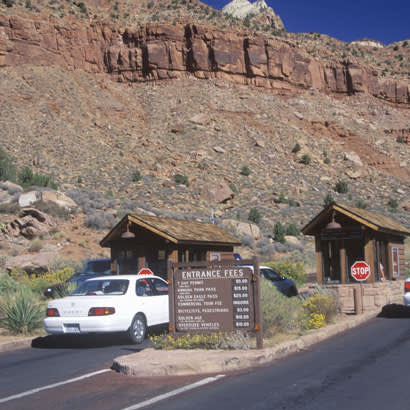
Americans oppose Interior Secretary Ryan Zinke’s plan to raise entrance fees in our most iconic and awe-inspiring national parks. According to a new bipartisan poll released by the Outdoors Alliance for Kids (OAK), an overwhelming majority of Americans believe our parks should remain open and available to all. Americans, across political parties, believe our parks should be funded federally and not through an entrance fee increase, which new evidence shows will likely have a dramatic impact on visitation.
In late October, the Trump administration proposed raising the park entry rates. Visitors to places, like Yellowstone, the Grand Canyon and Shenandoah National Park, would see entrance fees more than double — triple in some places — to $70 per vehicle during peak season.
The administration argues that the fee increase will help pay for crumbling infrastructure in our parks. We can all agree that our parks need to be cared for and maintained, but this is not a serious plan to do so. The maintenance backlog in our national parks is $11.9 billion — that’s billion, with a “b.” Earlier this year, President Trump and Secretary Zinke sent a proposal to Congress that would cut the park service budget by $322 million, the largest cut since World War II. Raising fees in our national parks, on the other hand, would generate less than $70 million, according to the Interior Department’s own estimates. Grade school math tells us it would take more than 160 years to reduce the maintenance needs in our parks at this rate.
Furthermore, new evidence demonstrates that 64 percent of Americans would be less likely to visit a national park if fees were increased. That number spikes to 71 percent among Americans with household incomes under $30,000 per year. Raising fees not only will make our national parks less accessible to middle- and low-income families, but will also negatively impact visitation across income levels.
Seventy-eight percent of Americans also worry that the fee increase will harm local economies and small businesses in communities near the parks that depend on tourism for their livelihoods. When less people visit, small businesses, such as restaurants, gas stations and hotels, will feel the brunt of this decision. These communities will likely see falling tax revenues, impacting the entire community. The bottom line is that fewer visitors mean less revenue generation for park maintenance, the administration’s stated purpose for raising fees in the first place, and will also negatively impact the communities surrounding our national parks.
While some days it seems like there is nothing but daylight between Republicans and Democrats, opposition to the fee hike presents an area of unity. Nearly 7 in 10 Americans — 68 percent — oppose the proposed fee increase, including majorities across all political and major demographic groups. When it comes to funding national parks, Americans overwhelmingly believe that increasing federal funding is a better approach than increasing entrance fees — 72 percent versus 28 percent, respectively.
A first visit to a national park often can ignite people’s love for the outdoors, a love they bring home to their local community. At NRPA and OAK, we are concerned with any proposal that would discourage people from visiting the outdoors. Our organizations are strong supporters of ensuring access to parks, on the national and at the neighborhood level. NRPA is continuing to work with cities and mayors across the country to ensure every American is within a 10-minute walk of a local park.
The National Park Service isn’t the only park organization facing a backlog in maintenance. According to the American Society of Civil Engineers’ 2017 Infrastructure Report Card, state parks face a deferred maintenance backlog of more than $95.3 million, and local parks face similar challenges. It was recently estimated that the combined local and state park maintenance backlog is around $12 billion. Raising fees to the proposed rate of $70 per vehicle may reverse important strides the park service has made over the years to expand equity and access to nature for all. To add insult to injury, the park service also just announced it will scale back fee-free days in national parks to just four days in 2018, plummeting from 16 in 2016 and 10 in 2017.
All children and youth should have opportunities and encouragement to experience nature. An overwhelming 92 percent of Americans agree that access to national parks provides kids with valuable opportunities to be active outdoors and to learn about the natural world. Eighty-five percent of Americans agree that increasing the visitor fees at national parks would make it less likely that children and people from lower-income families would have a chance to visit the parks.
Our children are already spending less time outdoors than any generation in history, with profound consequences for their health and wellness. America’s kids are suffering from a childhood obesity crisis, resulting in shorter life expectancies than their parents. Youth spend more than 50 hours a week on electronic media and just minutes a day playing outdoors. The situation is so dire that a national movement has emerged to reintroduce a new generation of kids to nature.
Historically, the Interior Department has championed opportunities for kids to experience America’s great outdoors. For example, leading up to the centennial of our national parks — just last year — the Find Your Park campaign and the Every Kid in a Park program were launched to connect the next generation with our parks in their city, state parks nearby, as well as our majestic national parks.
The American people want to see more opportunities, not less, for kids and families to experience nature. This proposed fee hike will do more harm than good no matter how you look at it, and the administration should withdraw its proposal.
Jackie Ostfeld is the Outdoors Associate Director for the Sierra Club and Founder & Chair of Outdoors Alliance for Kids. Kyle Simpson is NRPA’s Senior Government Affairs Manager.

